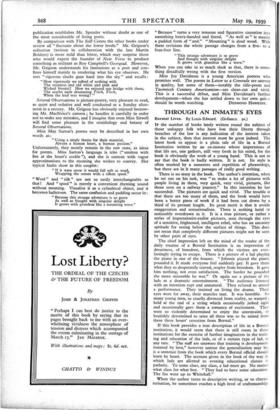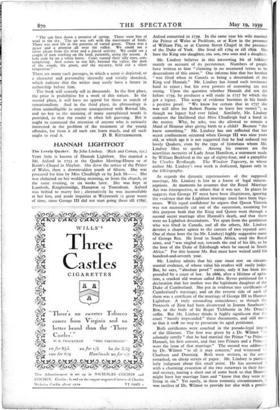THROUGH AN INMATE'S EYES
Borstal Lives. By Louis Edward. (Gollancz. 9s.) IF the number of books lately written round the subject of those unhappy folk who have lost their liberty through breaches of the law is any indication of the interest taken in the subject, then that interest must be great indeed. The latest book to appear is a plain tale of life in a Borstal Institution written by an ex-inmate whose impressions of that life are, one gathers, still very fresh in his mind, for the book is obviously the work of a young hand. This is not to say that the book is badly written. It is not. Its style is often marked by a sameness and repetition of phraseology, but there are in it many passages of really good writing.
There is no story in the book. The author's intention, when he set out on his task, was "to make a lot of pictures with people living in them, very quick, very vivid, pictures, like those seen on a railway journey." In this intention he has succeeded. The pictures are quick and vivid. The trouble is that there are too many of them, and the book would have been a better piece of work if it had been cut down by a third of its present length. Its great merit is that it avoids exaggeration and sensationalism. There is nothing lurid or noticeably overdrawn in it. It is a true picture, or rather a series of impressionist-realist pictures, seen through the eyes of a sensitive, frightened, intelligent rebel, who has an uncanny aptitude for seeing below the surface of things. This does not mean that completely different pictures might not be seen by other pairs of eyes.
The chief impression left on the mind of the reader of the daily routine of a Borstal Institution is an impression of dreariness, of boredom, from which the victims are ever- lastingly trying to escape. There is a picture of a lad playing the piano in one of the houses. "Johnnie played the piano, pounded it. It made everyone feel suddenly gay. It gave them what they so desperately craved, respite from boredom. It gave him nothing, not even satisfaction. The harder he pounded the more miserable he was." Or again see a picture of the lads at a dramatic entertainment. "The audience listened with an intention rapt and unnatural. They refused to attend a performance. They insisted on living the drama. Their eyes were far away, their muscles taut. It was horrible. So many young men, so cruelly divorced from reality, so warped ; held at the end of a string which occasionally jerked tight and occasionally gave them a romance of excitement. They were so violently determined to enjoy the unresuaint, so brutishly determined to seize all there was to be seized from these three hours' cessation from Borstal."
If this book provides a true description of life in a Borstal institution, it would seem that there is still room in these institutions for the exercise of further imagination in the train- ing and education of the lads, or of a certain type of lad, at any rate. "The staff are unaware that training is development
fostered by love," however untrue the generalisation may be,
is a sentence from the book which every Borstal official should learn by heart. The account given in the book of the way in which lads are allotted to evening educational classes is pathetic. To some class, any class, a lad must go. No matter what class for what boy. "They had to have some education The list went up to Whitehall."
When the author turns to descriptive writing, or to charac- terisation, he sometimes reaches a high level of craftsmanship.
"The sun beat down a promise of spring. There were bits of wool in the sky. The air was soft with the merriment of birds: There was new life in the patterns of varied green. There was a peace and a promise all over the valley. We could see a silver gleam from the river and a placid activity. We could see a couple of men working on the land, patiently, using the season. A lady rode by on a white horse. Cows turned their silly eyes, con- templating. And across to our left, beyond the valley, the dark - of the woods, the green, and the mystery, held out a silent temptation."
There are many such passages, in which a scene is depicted, or
a character and personality shrewdly and vividly sketched, which indicate that the writer may easily have a future in authorship before him.
The book will scarcely sell in thousands. In the first place, the price is prohibitive for a work of this nature. In the second place, it will have no appeal for those in search of sensationalism. And in the third place, its phraseology is often unintelligible to anyone unacquainted with Borstal life, and no key to the meaning of many unexplained words is provided, so that the reader is often left guessing. But it ought to command the attention of anyone who is seriously interested in the problem of the treatment of the young offender, for from it all such can learn much, and all such



















































 Previous page
Previous page